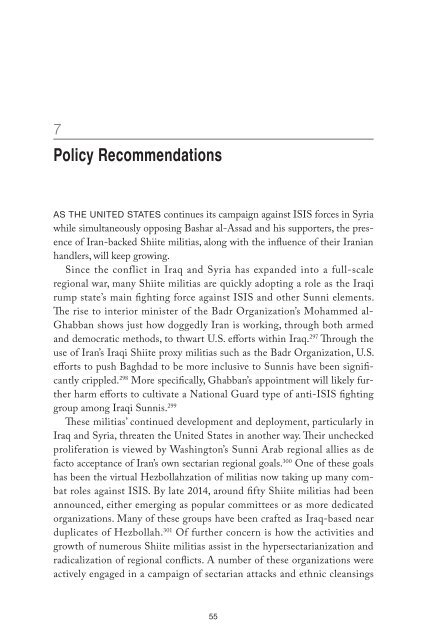Create successful ePaper yourself
Turn your PDF publications into a flip-book with our unique Google optimized e-Paper software.
7<br />
Policy Recommendations<br />
AS <strong>THE</strong> UNITED STATES continues its campaign against ISIS forces in Syria<br />
while simultaneously opposing Bashar al-Assad and his supporters, the presence<br />
of Iran-backed Shiite militias, along with the influence of their Iranian<br />
handlers, will keep growing.<br />
Since the conflict in Iraq and Syria has expanded into a full-scale<br />
regional war, many Shiite militias are quickly adopting a role as the Iraqi<br />
rump state’s main fighting force against ISIS and other Sunni elements.<br />
The rise to interior minister of the Badr Organization’s Mohammed al-<br />
Ghabban shows just how doggedly Iran is working, through both armed<br />
and democratic methods, to thwart U.S. efforts within Iraq. 297 Through the<br />
use of Iran’s Iraqi Shiite proxy militias such as the Badr Organization, U.S.<br />
efforts to push Baghdad to be more inclusive to Sunnis have been significantly<br />
crippled. 298 More specifically, Ghabban’s appointment will likely further<br />
harm efforts to cultivate a National Guard type of anti-ISIS fighting<br />
group among Iraqi Sunnis. 299<br />
These militias’ continued development and deployment, particularly in<br />
Iraq and Syria, threaten the United States in another way. Their unchecked<br />
proliferation is viewed by Washington’s Sunni Arab regional allies as de<br />
facto acceptance of Iran’s own sectarian regional goals. 300 One of these goals<br />
has been the virtual Hezbollahzation of militias now taking up many combat<br />
roles against ISIS. By late 2014, around fifty Shiite militias had been<br />
announced, either emerging as popular committees or as more dedicated<br />
organizations. Many of these groups have been crafted as Iraq-based near<br />
duplicates of Hezbollah. 301 Of further concern is how the activities and<br />
growth of numerous Shiite militias assist in the hypersectarianization and<br />
radicalization of regional conflicts. A number of these organizations were<br />
actively engaged in a campaign of sectarian attacks and ethnic cleansings<br />
55


